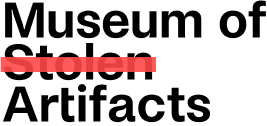About
The Museum of Stolen Artifacts is the first museum dedicated to stolen artifacts taken in the context of colonial violence. We are developing the world’s first central database of stolen artifacts, growing a network of collaborators, and creating resources to support restitution efforts.
Over the last six months, it has become clear that the museum is part of a growing global movement for restitution, fueled by updating government policies and increased public interest, as seen in international news stories and social media campaigns like #DevuelvanElMoai (’Return the Moai’).
In the first stage of MoSA we are focused on the Rapa Nui people, their objects and ontology. In this second stage, we will start integrating Māori objects beyond Rapa Nui, that are spread in Western museums. We will also open up digital submissions, so that people from different communities can contribute, modify and comment on data.
Current collaborators
Radical Data: Rayén Jara Mitrovich & Jo Jara Kroese, collective co-creating digital technology for liberation & Joy
Leo Pakarati, Rapa Nui filmmaker, journalist and activist
Valentin Vogelmann, heritage data specialist
Dr Amber Aranui, curator Mātauranga Māori at Museum of New Zealand Te Papa Tongarewa
Paula Rossetti, historian from Rapa Nui specialisied in cultural heritage of Rapa Nui
Conceptual Framework
Through evolving discussions with the core team and a wider network of thinkers, activists and creators, we have arrived at principles that form the bedrock of the project:
Embracing Multiplicity
Indigenous perspectives are diverse; there is no single view within a community. For example, Rapa Nui people have deeply varied views on the return of even the most important Moai statues. MoSA embraces this complexity, acknowledging that colonialism affects different groups in unique ways. This approach deromanticises Indigenous people, recognising their diverse and sometimes conflicting views.
There is Nothing ‘Post’ About Colonialism
Colonialism is not just history; its impacts persist today. The same power dynamics continue to influence narratives, language, and solutions related to repatriation. MoSA aims to highlight and challenge these ongoing colonial dynamics.
Museum of Action
MoSA disputes colonial power by creating new narratives and using indigenous perspectives to determine the future of artifacts. Avoiding empty theory, the museum embraces our positionality and encourages decolonial action, supporting the right of indigenous communities to decide if, when, and how their objects are returned.
Framing and an Alternative Narrative
In restitution, continued colonial power shows up in the control of the narrative. For example, colonial museums often frame stolen artifacts as ‘contested items,’ implying mutual valid claims. We challenge this by promoting the term ‘stolen artifacts,’ which underscores the need for return. As another example, the British Museum argues that Rapa Nui cannot care for the Moai but Rapa Nui people view these statues as living ancestors meant to return to the ecosystem, not be preserved infinitely in an foreign, white-walled room. MoSA recognises the debaters principle that “who defines the frame of a debate wins” and aims to build an alternative frame for restitution based on indigenous narratives and cosmologies.
Out-of-frame
Inspired by Leo’s filmmaking, we use the metaphor of “out-of-frame” aspects of stolen artifacts – the deep, complex histories and stories not captured by colonial museum plaques. MoSA will collect not just the artifacts but also documents, stories, and poems that reveal these deeper narratives.
